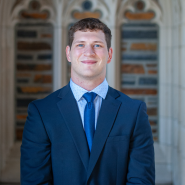Congratulations to the two new KURe scholars at Duke! Jennifer Hammel, PhD and Grant West, PhD began the program on September 1st, 2025.

Postdoctoral Research Associate
Dept of Biomedical Engineering
Dr. Hammel completed her undergraduate education in Bioengineering at Temple University, where she developed a 3D engineered model of vascularized adipose tissue. Remaining inspired to continue research, she then pursued her PhD in Biomedical Engineering at Virginia Tech. During her time there, she developed engineered models of the lymph node and meningeal lymphatics to study cell and fluid transport, response to chemotherapy, and metastasis. With this work, she saw the damage that cancer treatment can cause to healthy tissues in the body. Dr. Hammel now works with Sharon Gerecht at Duke University, whose lab focuses on understanding microenvironmental cues in vasculature across broad contexts.
As a KURe scholar, Dr. Hammel will develop a tissue engineered model of the bladder wall. She will use this model to study radiation cystitis with clinical mentorship from Dr. Andrew Peterson. This research aims to identify novel mechanisms behind radiotherapy-induced bladder dysfunction and to develop a useful in vitro platform for testing countermeasures and treatments. Dr. Hammel is passionate about creating sophisticated in vitro models to understand the long-lasting impacts of cancer treatment and using these platforms to develop therapeutics that improve quality of life for cancer survivors.

Grant West, PhD
Postdoctoral Associate
Mechanical Engineering and Material Science
Dr. West completed his undergraduate education at Lehigh University in Civil and Environmental Engineering and earned his PhD at Cornell University. During his graduate studies, Dr. West developed expertise in mechanical testing conceptualization, analysis, and simulation for fatigue and fracture prediction. Computationally, he contributed to algorithm development for efficiently calculating fracture properties in brittle solids from displacement data. His dissertation emphasized his experimental contributions, particularly a novel high-throughput, high-cycle fatigue testing methodology to characterize aerospace alloy behavior.
As a KURe scholar working in the Dolbow computational mechanics laboratory, Dr. West is applying his prior experience to characterize kidney stone ablation and fracture during laser lithotripsy. Through mechanical testing and modern computational techniques, his goal is to build a predictive framework for the timing and location of kidney stone fracture initiation and propagation during procedures, leading to safer and more effective outcomes. His broader research interests include creating innovative experimental strategies for fatigue characterization of biomaterials and developing computational models for the multi-physics problems inherent to complex environments. Ultimately, his work aims to advance predictive mechanics across both biomedical and structural systems.
